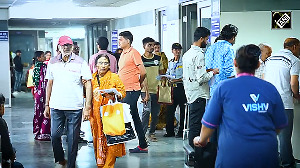Most of us will not have heard of the Akshaya project. This isn't because we haven't been paying attention -- most of the people of Kerala, outside of the Malappuram district, where the project is based, have not heard of it either.
Within Malappuram, however, it is changing lives daily, in a very real and exciting way.
In November 2002, the state government of Kerala put into place a project, piloted in Malappuram, that aimed for one person in every family to be computer literate in that district.
One year later, the scheme had already found success -- over 500 Akshaya centres (basically computer labs) had been built throughout the district, and a village, Chemaravattom, was already fully computer literate (perhaps the first of its kind in the world).
The next step, obviously, was to create a network so that the villagers and residents of Malappuram would be able to utilise this new computer literacy, and log on to the Internet.
For this, they turned to Tulip, an IT services company that has been in existence since 1992. Until now, Tulip has been catering to large corporations such as Cisco and Tata Finance, which are spread over cities, building long distance networks for inter-department communication.
The Malappuram project, however, signaled a complete change of direction. Col H S Bedi, founder and managing director, Tulip, says, "Although most of our work lies with corporations, I thought this could be an interesting and rewarding way to expand our business. Seventy per cent of our population lives in rural areas -- and there's absolutely no connectivity.
I recognised that there was huge scope for good work in this field. I realised that we could be the forerunners for something much greater."
Tulip came up with a cost-efficient way of ensuring that the entire district of Malappuram was connected -- entirely wirelessly (the rough, wild terrain of rural Kerala made laying fibre-optic cable impractical).
What they did was put up point-to-point and point-to-multipoint radio masts (they didn't even need to construct towers), using Versatile Intelligent Network and Wireless in Local Loop technology.
This relatively new technology enabled the Akshaya centres to link to the Internet at a bandwidth of 4-8 megabytes per second; it can even carry voice and video data.
The project worked like a charm -- minimising the capital needed, ensuring that the network spread to even the remotest areas, on low or high ground, enabling a relatively hassle-free connection and a low cost for subscribers -- so much so that the government of Kerala is planning to extend this network to six other districts.
According to P H Kurien, at the IT department with the Kerala state government, "We plan to initiate the Akshaya IT project in Kasargod, Kannur, Kozhikkode, Thrissur, Ernakulam and Kollam, for 100 per cent computer literacy.
"By the end of October, a survey will be conducted in these districts and one member from every family will be selected for computer training. The classes will commence by November. The government's plan is to give computer training to 3 million people, allocating funds through district, block and village panchayats."
The cost per district is Rs 6 crore (Rs 60 million), according to Col Bedi. "The government has already sanctioned Rs 43,000 crore (Rs 430 billion) to build these wireless networks across the country.
"Even economically, it makes sense. There are 65,000 bank branches all over the country, and only a third of them are in urban areas. It's incredibly wasteful to not have a proper connectivity with rural areas.
"Transactions will now become easier, saving time and money. Even the productivity of these districts will rise, for the people will become more skilled and have a better idea of their opportunities."
The possibilities are truly endless. For one thing, this is a district where many have gone abroad to work -- the Internet is obviously the most efficient way to keep in touch with family members who are away, and many of the residents of Malappuram are using the computers for this purpose.
However, it does not stop there. "Spoken English classes and Arabic typewriting classes will be started in the Akshaya IT centres. Malappuram is a Muslim-dominated district of Kerala and a large number of people from this district are working abroad, mainly in the Gulf," says Kurien. The centres themselves are manned by 4-5 people on average, and 25 percent of this workforce is made up of women.
Tailors are downloading new embroidery designs to help their clothes fetch a higher price; farmers can sell their produce through e-krishi, an online scheme developed with the aid of UNDP, and the government is even planning to introduce the business that is sweeping throughout India -- outsourcing.
Medical forms and reports, for instance, can be transcribed here at a fraction of the cost abroad.
Akshaya is also a scheme for more efficient governance, and not just for local government offices being hooked up, but Malappuram residents can also pay their electricity and telephone bills online.
The Tulip network reaches sectors such as life insurance, housing loans, police stations, senior secondary schools and panchayats, making financial transactions much easier.
The ease with which one can set up a business is sometimes a indicator of how developed an economy is; with this kind of connectivity, setting one up in Malappuram has suddenly become very easy indeed.
Thanks to the success of this pilot, the government of India is now looking at expanding this model over 20 states.
With the mobile telephony revolution having already started the process of connecting remote rural areas to the development of the rest of the country, Kerala's e-literacy initiative could very well be the next important step.





